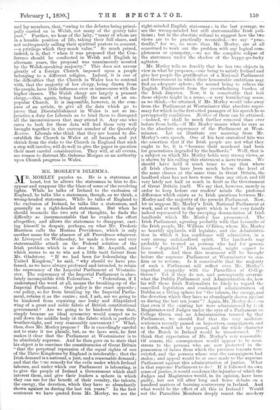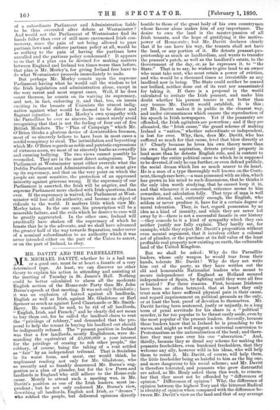MR. MORLEY'S DTLEMMA.
MR. MORLEY puzzles us. He is a statesman at heart, but he allows the statesman in him to dis- appear and reappear like the blaze of some of the revolving lights. While he talks of Ireland to the exclusion of England, he talks like a statesman, though, as we think, a wrong-headed statesman. While he talks of England to the exclusion of Ireland, he talks like a statesman, and generally as a right-headed statesman. But when he should reconcile the two sets of thoughts, he finds the difficulty so insurmountable that he evades the effort altogether, and allows the statesman to disappear, cast- ing himself in despair, perhaps, on what Mr. Frederic Harrison calls the Human Providence, which is only another name for the absence of all Providence whatever. At Liverpool on Wednesday, he made a fierce and very statesmanlike attack on the Federal solution of the Irish problem which is so dear to Mr. Asquith, and which seems to us to win not a little tacit favour from Mr. Gladstone. "If we had been for federalising the United Kingdom," he said, "why should we have pro- fessed, as we have always professed and intended, to retain the supremacy of the Imperial Parliament at Westmin- ster. The supremacy of the Imperial Parliament is abso- lutely incompatible with Federalism." "Federalism, if I understand the word at all, means the breaking-up of the Imperial Parliament. Our policy is the exact opposite ; our policy, so far from breaking up the Imperial Parlia- ment, retains it_as the centre ; and, I ask, are we going to be hindered from repairing one leaky and dilapidated wing of a great and noble fabric of British constitutional government ? Are we going to be hindered from that, simply because an ideal symmetry would compel us to pull down the middle body of. the fabric which is perfectly weather-tight, and very reasonably convenient ? " What, then, does Mr. Morley propose ? He is exceedingly careful not to state it too plainly, but, as we have seen, he first makes it clear that the Parliament at Westminster is to be absolutely supreme. And he then goes on to state that his object is to convince the constituencies of Great Britain "that the perpetual repression of the equal rights of one of the Three Kingdoms by England is intolerable ; that the Irish demand is a national, a just, and a reasonable demand ; and that the true remedy for the evils under which Ireland labours, and under which our Parliament is labouring, is to give the people of Ireland a Government which shall interest them, and give their leaders a sphere in which they can use for the benefit of their country, the talents, the energy, the devotion, which they have so abundantly shown against us during the last ten years." In the first sentences we have quoted from Mr. Morley, we see the right-minded English statesman ; in the last passage, we see the wrong-minded but still statesmanlike Irish poli- tician; but in the absolute refusal to suggest how the two views are to be practically reconciled,—we say "prac- tically," for we, no more than Mr. Morley, are at all concerned to work out the problem with any logical com- pleteness or symmetry,—we see the complete eclipse of the statesman under the shadow of the happy-go-lucky agitator.
Mr. Morley tells us frankly that he has two objects in view in what he proposes,—one being to satisfy Ireland and give her people the gratification of a National Parliament and Government in which their honourable ambitions may find an adequate sphere ; the second being to relieve the English Parliament from the overwhelming burden of the Irish disputes. Now, it is conceivable that both these objects might in a sense,—a very humiliating sense, as we think,—be attained, if Mr. Morley would take away from the Parliament at Westminster that absolute supre- macy for which in the first-cited passages of his speech he so peremptorily conditions. Neither of them can be attained, —indeed, we shall be much further removed than ever before from both,—if Mr. Morley means what he says as to the absolute supremacy of the Parliament at West- minster. Let us illustrate our meaning from Mr. Morley's own speech. One of his best oratorical hits was the assertion that if the Irish people are not what they ought to be, it is "because their manhood had been for generations degraded by the landlords." Well, that is a subject on which Mr. Morley holds very strong views, as is shown by his calling this statement a mere truism. We should have held it much truer to say that where all Irish classes have been much below the level of the same classes at the same time in Great Britain, the landlord class has not been worse than any other, and till very lately not half as much in fault as the Government of Great Britain itself. We say that, however, merely in order to keep before our readers' minds the profound difference which exists as to Irish questions between Mr. Morley and the majority of the present Parliament. Now, let us suppose Mr. Morley's Irish National Parliament at work, and at work in the spirit which is but very faintly indeed represented by the sweeping denunciation of Irish landlords which Mr. Morley has pronounced. The Irish Parliament, agreeing probably with that favourite of the Irish people, Mr. William O'Brien, whom Mr. Morley so heartily applauds, will legislate, and the Administra- tion in which it has confidence will administer, in a very strong anti-landlord spirit. The landlords may probably be treated as persons who had for genera- tions " degraded " Irish manhood, might expect to be treated. And then this treatment will be brought before the supreme Parliament at Westminster to con- firm or to reverse. Is it conceivable that the majority of such a Parliament will reflect even Mr. Morley's imperfect sympathy with the Parnellites of College Green ? Yet if they do not, and peremptorily overrule what the Dublin Parliament and Administration do, how far will these Irish Nationalists be likely to regard the cancelled legislation and condemned administration of Dublin as a fitting sphere for "the talents, the energy, and the devotion which they have so abundantly shown against us during the last ten years"? Again, Mr. Morley declares that even if the existing law were administered by Irish Magistrates and Judges under the eyes of a Parliament on College Green and an Administration trusted by that Parliament, we should find that the very moderate sentences recently passed on boycotters, campaigners, and so forth, would not be passed, and the whole character of the Bench in Ireland would be transformed. We think that expectation of Mr. Morley's very reasonable. Of course, the consequences would appear to be mon- strous to the persons who are now protected m the possession of farms from which the previous tenants were evicfed, and the persons whose rent the campaigners had stolen ; and appeal would be at once made to the supreme Parliament against this administration of justice. What is that supreme Parliament to do ? If it followed its own sense of justice, it would condemn the injustice of which the Judges and Magistrates would, in its opinion, have been guilty, but not till after long and fierce debate on a hundred matters of burning controversy in Ireland. And. what would be the effect of all this in Ireland ? Would not the Parnellite Members deeply resent the mockery of a subordinate Parliament and Administration liable to be thus overruled after debate at Westminster ?
And would not the Parliament of Westminster find its hands fuller than ever of still more envenomed Irish con- troversy, since the pain of not being allowed to pass partisan laws and enforce partisan policy at all, would be as nothing to the pain of having the partisan laws annulled and the partisan policy condemned ? It appears to us that if a plan can be devised for making matters between England and Ireland ten times worse than before, that plan is Mr. Morley's, for giving Ireland free leave to do what Westminster proceeds immediately to undo.
But perhaps Mr. Morley counts upon the supreme Parliament having what he would call the wisdom to let the Irish legislation and administration alone, except in the very rarest and most urgent cases. Well, if he does count thereon, he counts on its waiving its supremacy, and not, in fact, enforcing it, and that, too, on issues exciting in the breasts of Unionists the utmost indig- nation against what would be deemed to be direct and flagrant injustice. Let Mr. Morley's own sympathy with the Parnellites be ever so sincere, he cannot surely avoid recognising that that is not the feeling of four out of five British Members. The "Plan of Campaign" which Mr. O'Brien thinks a glorious device of downtrodden freemen, most of us sincerely believe to have been in most eases a sordid conspiracy to steal. The intimidation and boycotting which Mr. O'Brien regards as noble and patriotic expressions of virtuous scorn, we most of us sincerely loathe as cowardly and cunning bullying. The two views cannot possibly be reconciled. They are in the most direct antagonism. The Parliament at Westminster must either overrule what the Dublin Parliament and Administration do, or it must give up its supremacy, and that on the-very point on which the people are most sensitive, the protection of an oppressed minority against grievous wrong. If the supremacy of our Parliament is asserted, the Irish will be angrier, and the supreme Parliament more choked with Irish questions, than ever. If the supremacy is waived, the Parliament at West- minster will lose all its authority, and become an object of ridicule to the world. It matters little which view Mr. Morley takes. In the one case, his prescription will be a miserable failure, and the evils which he desires to cure will be greatly aggravated. In the other case, Ireland will practically have shaken off the supremacy of which he boasts that he is the advocate, and we shall have advanced the greater half of the way towards Separation, under cover of a nominal subordination to an authority which it was never intended either on the part of the Union to assert, or on the part of Ireland, to obey.



































 Previous page
Previous page